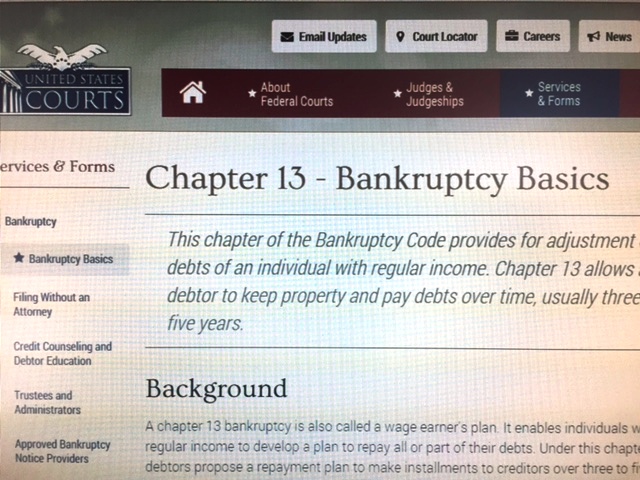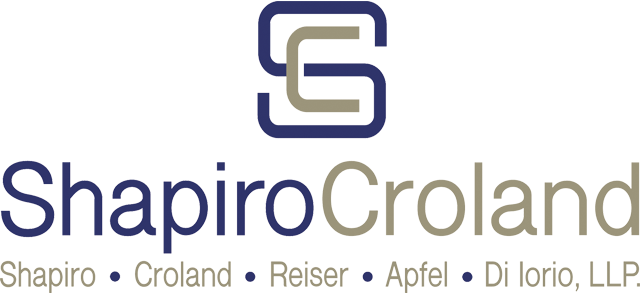Chapter 13 b ankruptcy is often referred to as a wage earner case or an individual reorganization bankruptcy. For debtors our Chapter 13 representation is concentrated in the United States Bankruptcy Court for the District of New Jersey in Newark and Trenton.
ankruptcy is often referred to as a wage earner case or an individual reorganization bankruptcy. For debtors our Chapter 13 representation is concentrated in the United States Bankruptcy Court for the District of New Jersey in Newark and Trenton.
Why Chapter 13, and not Chapter 7?
Where a debtor has valuable nonexempt property and wants to keep it, a chapter 13 may be a better option. In some instances individuals or couples are required to file for Chapter 13 because their income exceeds the maximum standards permitted to file for Chapter 7 - a much simpler and less costly form of bankruptcy. Whereas a debtor in Chapter 7 usually does not have to pay any of his/her unsecured creditors, in a Chapter 13 the debtor is required to pay some or all of their unsecured creditors over a 3-5 year period.
Because Chapter 13 of the U.S. Bankruptcy Code allows consumers the ability to cure a loan default, Chapter 13 cases are typically used to prevent the foreclosure of a home or repossession of a leased or financed automobile. In fact, the United States Bankruptcy Court for the District of New Jersey has a loss mitigation program that allows debtors to pursue loan modifications with their mortgage lenders. At Shapiro Croland we help homeowners save their homes from foreclosure. In addition, Chapter 13 can be used to prevent eviction by a landlord.
Chapter 13 eligiblity
Any individual, even if self-employed or operating an unincorporated business, is eligible for chapter 13 relief as long as the individual's unsecured debts are less than $383,175 and secured debts are less than $1,149,525. 11 U.S.C. §109(e). These amounts are adjusted periodically to reflect changes in the consumer price index. A corporation or partnership may not be a chapter 13 debtor. Id.
The automatic stay stops most civil lawsuits
The filing of a Chapter 13 bankruptcy petition under federal law creates an automatic stay that stops most civil lawsuits including mortgage foreclosures, collection lawsuits, and actions to repossess secured collateral such as automobiles. For landlord/tenant eviction cases, however, if the landlord obtained a judgment for possession prior to the bankruptcy filing then the automatic stay does not apply and the state court can evict the debtor unless the debtor petitions the bankruptcy court to reinstate the automatic stay.
The role of the Chapter 13 bankruptcy trustee and the Chapter 13 plan confirmation process
Chapter 13 cases are administered by the Chapter 13 bankruptcy trustee appointed for your particular region of New Jersey. Similar to a Chapter 7 bankruptcy trustee, the Chapter 13 trustee will question you under oath at an initial meeting of creditors.
Unless the court grants an extension, the debtor must file a repayment plan with the bankruptcy petition or within 14 days after the petition is filed. Fed. R. Bankr. P. 3015. A plan, typically proposing a 3-5 year repayment period, must be submitted for court approval and must provide for payments of fixed amounts to the trustee on a regular basis, typically monthly. The trustee then distributes the funds to creditors according to the terms of the plan, which may offer creditors less than full payment on their claims.
The Chapter 13 trustee's role is to ensure that debtors comply with their fiduciary obligations and that their proposed Chapter 13 plan meets the criteria for confirmation. If you can stick to the terms of your Chapter 13 plan, all your remaining dischargeable debt will be released at the end of the plan (typically 3 to 5 years).
How much will I have to pay in a Chapter 13 plan?
The amount to be repaid under a Chapter 13 plan depends upon several factors including the debtor’s disposable income as is usually determined as part of a financial means test. Unlike in a Chapter 7 bankruptcy, a Chapter 13 debtor can retain assets whose value exceeds the maximum federal exemptions. The plan need not pay unsecured claims in full as long as the debtor proposes to pay all projected "disposable income" over an "applicable commitment period," and as long as unsecured creditors receive at least as much under the plan as they would receive if the debtor filed for Chapter 7 liquidation.
Why hire Shapiro Croland as my Chapter 13 bankruptcy counsel?
Bankruptcy is a complex area of the law that requires particular expertise. For more than 25 years our experienced New Jersey bankruptcy lawyers have been guiding individuals and couples through Chapter 13 bankruptcy filings. Our clients have ranged from blue collar workers to service professionals and small business owners. We are here to help you resolve your financial crisis.
Contact our NJ Chapter 13 bankruptcy attorneys today. Find out how we can help you save your home and car.
